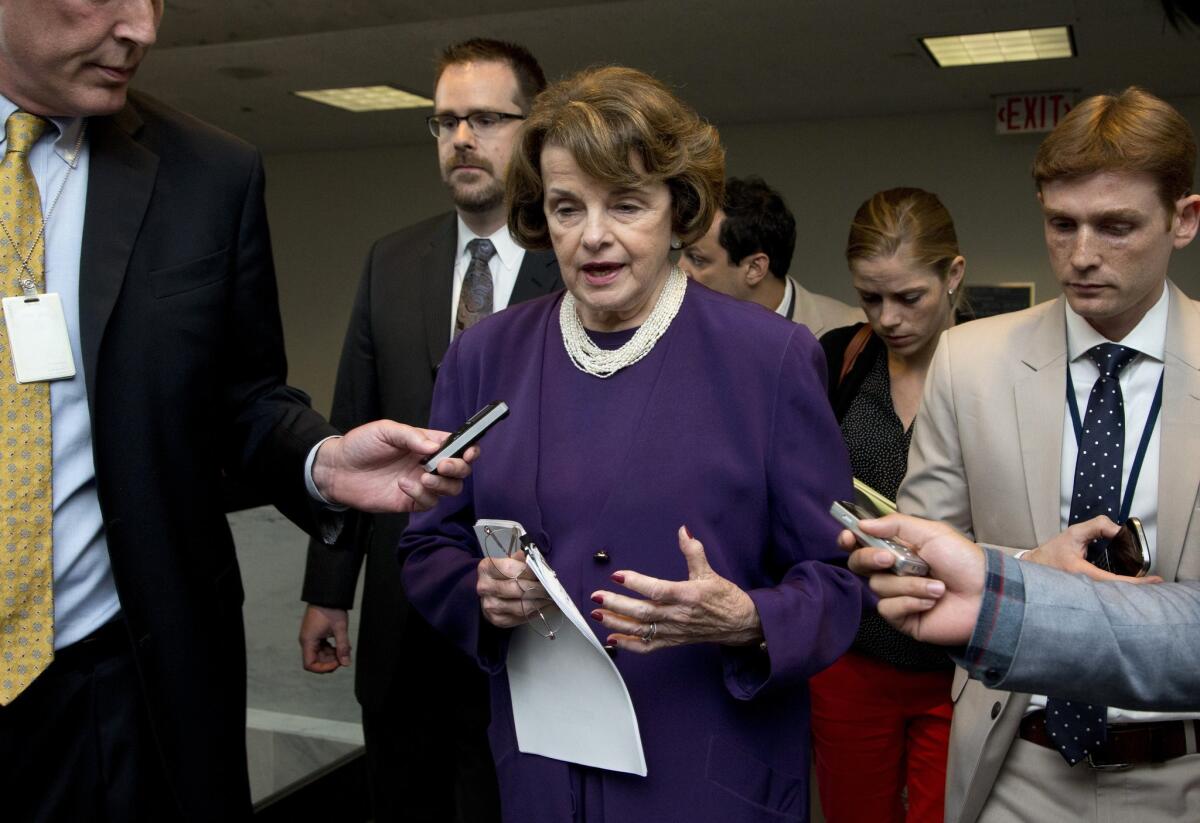U.S. braces for release of long-delayed report on CIA torture

Reporting from Washington â The most extensive review of U.S. intelligence-gathering tactics in generations is set to be made public Tuesday, reigniting a post-9/11 public debate over the use of torture to combat terrorism.
The Senate Intelligence Committeeâs much-anticipated report comes after a years-long review of CIA practices and subsequent wrangling with the spy agency and the White House over whether its contents should be made public and, if so, which parts should be redacted.
In one of her final acts after six years as chair of the committee that oversaw the review, Sen. Dianne Feinstein (D-Calif.) plans to discuss the findings in a speech on the Senate floor Tuesday morning as the reportâs 480-page executive summary is released online. A response by Republican members of the committee will be released almost simultaneously, as will one by the CIA itself. But the full 6,300-page report on Rendition, Detention and Interrogation, or RDI, will remain classified.
Feinstein said she hoped the public would view the report in the âspirit of a just society [that] functions under law, and that when we make mistakes we admit them, we correct them, and we move on,ââ she told reporters Monday. âI think thatâs an important thing.â
The inquiry is expected to reveal how the agency used waterboarding, sleep deprivation, stress positions and other so-called enhanced interrogation techniques more frequently than was legally authorized at then-secret prisons known as âblack sites,â the Chicago Tribune/Los Angeles Times Washington bureau has reported.
It also rebuts claims that the interrogations were key to locating Osama bin Laden or thwarting other terrorist plots, concluding that nearly all the intelligence gleaned through harsh techniques could have been obtained from more traditional intelligence-gathering systems.
As Feinstein finalized plans to release part of the report, Secretary of State John F. Kerry phoned her Friday to warn of the potential consequences of releasing the report at this time. The State Department called for a review of security measures at overseas missions as a precaution against possible demonstrations, and White House spokesman Josh Earnest said Monday that the administration has taken âprudent steps to ensure that the proper security precautions are in placeâ at U.S. facilities around the world.
The administration insisted, though, that it supported the review and that the timing of its publication was entirely up to the committee. Obama said this year that the nation âdid a whole lot of things that were rightâ in the aftermath of 9/11, but also âwe tortured some folks.â
âWhen we engaged in some of these enhanced interrogation techniques -- techniques that I believe and I think any fair-minded person would believe were torture -- we crossed a line,â he said at an August news conference. âThat needs to be understood and accepted. And we have to, as a country, take responsibility for that so that, hopefully, we donât do it again in the future.â
Former President George W. Bush defended the work of the CIA under his administration, and said that if the report âdiminishes their contributions to our country, it is way off base.â
âThese are good people, really good people, and weâre lucky as a nation to have them,â he told CNN in an interview aired Sunday.
The review was launched by members of the Democrat-led committee in 2009 shortly after Obama succeeded Bush in the White House and ordered a halt to controversial interrogation tactics his predecessor had sanctioned. Its initial intent was in part to determine if lawmakers were kept fully informed of such practices, and its creation drew comparisons to the 1975 Church Committee, whose work ultimately led to the creation of permanent committees on intelligence agencies in Congress.
The interrogation committee completed an initial review in 2012. In August, the White House returned a draft to the committee that blacked out some of its contents, beginning an intense round of negotiations between Feinstein and the administration. Feinstein said last week that from a list of hundreds of redactions she had narrowed the differences to just two.
As word of the reportâs impending release spread throughout Washington, Democrats defended it as an essential self-examination by a global superpower.
Sen. Claire McCaskill (D-Mo.) called it a âgut check moment for our democracy,â saying, âItâs incumbent upon a democracy in terms of our values that we represent to the world that when we have bad moments we hold ourselves accountable.â
Republicans warned of the potential fallout from the release.
âThink of the cartoons in Denmark and how many people died as a result,â Rep. Mike Rogers (R-Mich.), the chairman of the House Intelligence Committee, told CNN on Sunday. âThink of the burning of the Korans and how many people died as a result. They will use this to incite violence.â
âThis is a defunct program that was put to bed six years ago,â said Sen. Dan Coats (R-Ind.), a member of the intelligence committee who was one of three Republicans who voted not to declassify the report. âThe report has no recommendations. Itâs sort of like condemnation, but not constructive from the standpoint of saying what would you do differently.â
Coats said he did not expect the panel to conduct any follow-up when Republicans assume the Senate majority in January. âI think this comes out and we move on.â
More to Read
Sign up for Essential California
The most important California stories and recommendations in your inbox every morning.
You may occasionally receive promotional content from the Los Angeles Times.











